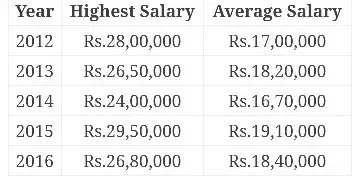BSc Anesthesia Salary in India: A Comprehensive Guide
BSc Anesthesia is a specialized field in healthcare, vital for surgical procedures and patient care. Understanding the salary structure for professionals in this field is crucial for those considering a career path in anesthesia.
Factors Influencing BSc Anesthesia Salary
Several factors influence the salary range for BSc Anesthesia graduates in India:
1. Experience and Expertise
As with any profession, experience plays a significant role in determining salary. Entry-level positions may offer lower pay compared to roles requiring several years of experience. Additionally, specialized expertise or certifications can command higher salaries.
2. Geographic Location
Salary levels can vary significantly based on the region or city where an anesthesiologist practices. Metropolitan areas or regions with a high demand for healthcare services often offer higher salaries to attract talent.
3. Type of Healthcare Facility
The type of healthcare facility also impacts salary prospects. Government hospitals, private clinics, and corporate healthcare institutions may offer different salary packages and benefits.
4. Skill Set and Specializations
Professionals with additional skills or certifications, such as advanced life support or pain management, may negotiate higher salaries. Specializing in niche areas within anesthesia can also increase earning potential.
5. Market Demand
The demand for anesthesiologists in a particular region or healthcare sector influences salary levels. Areas with a shortage of skilled professionals may offer competitive salaries to attract talent.
Average Salary Range for BSc Anesthesia Graduates
While salaries can vary based on individual circumstances, the average salary range for BSc Anesthesia graduates in India falls between INR 25,000 to INR 80,000 per month for entry-level positions. With experience and specialization, this range can increase significantly.
Career Growth and Opportunities
Despite the initial salary range, BSc Anesthesia offers promising career growth opportunities. As professionals gain experience and expertise, they can advance to higher positions within healthcare institutions, academia, or research organizations.
1. Senior Anesthesiologist
With years of experience and proven expertise, an anesthesiologist can advance to senior positions within hospitals or healthcare organizations. These roles often come with increased responsibilities and higher compensation packages.
2. Academic Positions
Experienced professionals may choose to transition into academic roles, teaching aspiring anesthesiologists and contributing to research in the field. Academic positions offer a unique blend of clinical practice, education, and research opportunities.
3. Consultant or Freelance Work
Some anesthesiologists opt for freelance or consultant roles, providing specialized services to multiple healthcare facilities or collaborating with surgical teams on a project basis. These roles can offer flexibility and potentially higher earning potential.
Conclusion
While salary is an important consideration, a career in BSc Anesthesia offers more than just financial rewards. The opportunity to make a significant impact on patient care, continuous learning, and professional fulfillment are equally valuable aspects of this profession. By understanding the factors influencing salary and exploring diverse career paths, BSc Anesthesia graduates can chart a rewarding and fulfilling career in healthcare.



